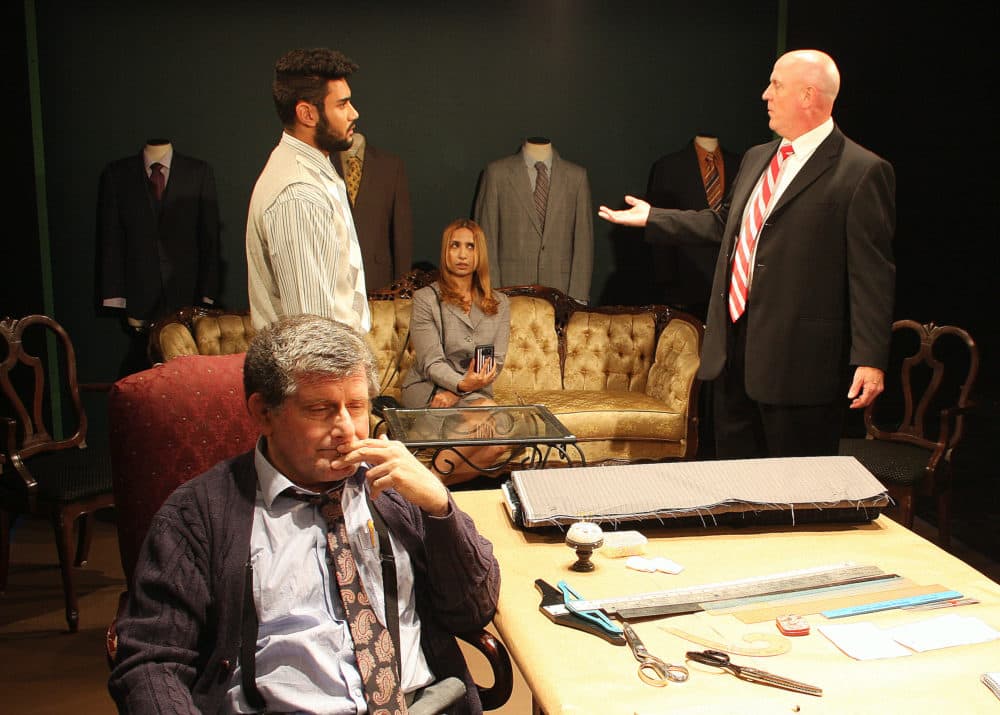Advertisement
Review
Zeitgeist Stage's 'Vicuña' Plays More Like A Satire Than A Chilling Political Drama

Stop me if you’ve heard this one: a wealthy TV personality and real estate maven with no political wherewithal runs on a platform of hatred and decisiveness and becomes the next president of the United States.
That's the plot “Vicuña,” an amusing but heavy-handed play by Jon Robin Baitz, now making its New England premiere at Zeitgeist Stage Company, spins on.
It is also important to note that this 18th season at Zeigeist Stage will, unfortunately, be its last. (There is one more show left: “Trigger Warning,” which opens in April.) According to David Miller, who is the company’s artistic director as well as this play's director, dwindling audiences over the last two years has damaged the company’s financial health.
When “Vicuña” premiered at Los Angeles’ Center Theatre Group in the weeks leading up to the last presidential election, Baitz’s play seemed prescient, yes, but also novel: Trump hadn’t been elected yet and the play functioned as more of a political fantasia than as a literal, hopeless reflection of the times.
In the two years since the election, though, the truth has been stranger than fiction and “Vicuña” both fails to equal the juiciness of today’s headlines and hits too close to home.
But in this case, the candidate in question is Kurt Seaman (Steve Auger) and the play begins when he stops into a Manhattan tailor shop (even monsters need suits) and demands the best suit money can buy for his upcoming final debate against an unnamed female opponent. The tailor, Anselm (an understated Robert Bonotto), is rather prolific as far as bespoke tailors are concerned: he’s dressed Bush, Reagan, and Idi Amin, so he’s not averse to putting aside politics for the business (he’s charging Seaman $150,000 for a Vicuña suit) and since he’s also an Iranian-Jewish immigrant, you can probably figure out where some of the play’s tension comes from.

Most of the play’s remaining tension comes from Amir (played by Jaime Hernandez), an Iranian-Muslim immigrant who works as Anselm’s apprentice (get it?) and who has no trouble saying what his thinks about Seaman’s xenophobic, racist rhetoric. Amir worries about his parents, who are not American citizens, but Anselm assures him that it’s all just talk.
Amir doesn’t even hold back in front of Seaman’s daughter and campaign manager, Sri-Lanka, played by perfect Ivanka-esque poise by Srin Chakravorty. When Sri-Lanka begins to voice her concerns to her father about his compassionless campaign, Seaman blames Amir for emboldening her, which isn’t entirely true: this future first daughter has a moral compass.
As tensions between father and daughter grow and Amir’s family’s safety hangs in the balance, Sri-Lanka, Amir, and Anselm must decide what to do and what the potential cost of that action — or inaction — could be.
Seaman, too, has a decision to make: RNC chairwoman Sen. Kitty Finch-Gibbon (Evelyn Holley) offers him billions of dollars to drop out of the race. Even though he’s down in the polls, Republicans are unwilling to take the chance and want him out.
The play’s most compelling parts have to do with the way that Sri-Lanka, and then Finch-Gibbon, stand up to the grotesque Seaman. (The latter calls him a demon Manchurian candidate.) But for all of the novelty that comes from us watching fictional characters tear into a Trumpian blowhard, Baitz’s play is stuck between wanting to be a satire (where it succeeds) and wanting to be a chilling political drama (where it fails).
Miller’s production is propulsive and thoughtful — and there is at least one great performance in Chakravorty — but I struggled to hear entire swathes of dialogue from Hernandez, who spoke too quietly, too quickly. (It wasn’t until I reviewed the script afterwards that I was able to understand the entire story.)
If “Vicuña” isn’t quite the warning that it might have been pre-election, then what is its role now? Is it a funeral for democracy? An elegy for the complacent? It doesn’t seem like Baitz has the answer to that question.
Zeitgeist Stage Company's “Vicuña” runs through Oct. 6.
Christopher Ehlers is the associate theater editor for DigBoston and theater critic for TheaterMania. He is a member of the Boston Theater Critics Association. Follow him on Twitter at @_ChrisEhlers.